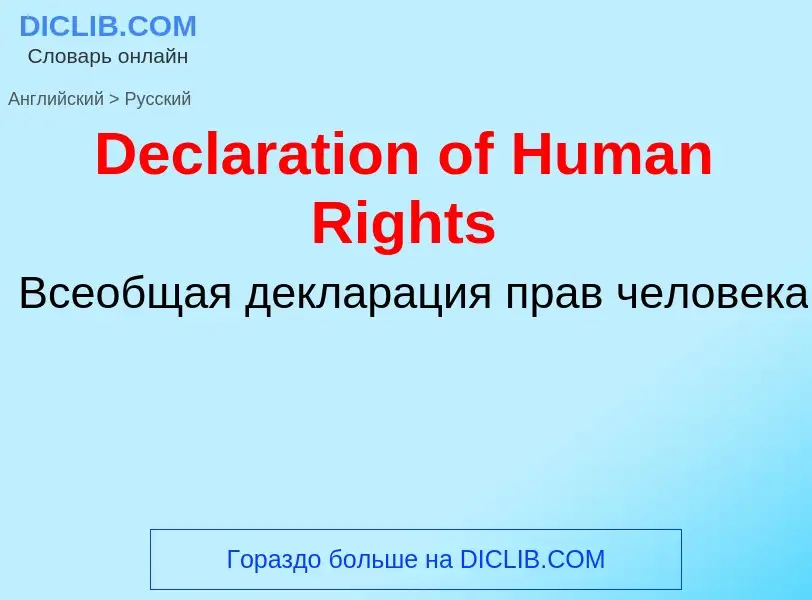Tradução e análise de palavras por inteligência artificial ChatGPT
Nesta página você pode obter uma análise detalhada de uma palavra ou frase, produzida usando a melhor tecnologia de inteligência artificial até o momento:
- como a palavra é usada
- frequência de uso
- é usado com mais frequência na fala oral ou escrita
- opções de tradução de palavras
- exemplos de uso (várias frases com tradução)
- etimologia
Declaration of Human Rights - tradução para russo
Definição
Wikipédia
The Cairo Declaration on Human Rights in Islam (CDHRI) is a declaration of the member states of the Organisation of Islamic Cooperation (OIC) first adopted in Cairo, Egypt, on 5 August 1990, (Conference of Foreign Ministers, 9–14 Muharram 1411H in the Islamic calendar), and later revised in 2020 and adopted on 28 November 2020 (Council of Foreign Ministers at its 47th session in Niamey, Republic of Niger). It provides an overview on the Islamic perspective on human rights. The 1990 version affirms Islamic sharia as its sole source, whereas the 2020 version doesn't specifically invoke sharia. The focus of this article is the 1990 version of the CDHRI.
The CDHRI declares its purpose to be "general guidance for Member States [of the OIC] in the field of human rights". This declaration is widely acknowledged as an Islamic response to the United Nations' Universal Declaration of Human Rights (UDHR), adopted in 1948. It guarantees some, but not all, of the UDHR and serves as a living document of human rights guidelines prescribed for all members of the OIC to follow, but restricts them explicitly to the limits set by the sharia. Because of this limit, the CDHRI has been criticized as an attempt to shield OIC member states from international criticism for human rights violations, as well as for failing to guarantee freedom of religion, justifying corporal punishment and allowing discrimination against non-Muslims and women.

.jpg?width=200)
![Guantanamo Bay]] Guantanamo Bay]]](https://commons.wikimedia.org/wiki/Special:FilePath/Camp x-ray detainees.jpg?width=200)
![[[Declaration of the Rights of Man and of the Citizen]] approved by the National Assembly of France, 26 August 1789 [[Declaration of the Rights of Man and of the Citizen]] approved by the National Assembly of France, 26 August 1789](https://commons.wikimedia.org/wiki/Special:FilePath/Declaration of Human Rights.jpg?width=200)
![date=22 June 2017 }} 10 December 1948 in Paris, France</ref> [[Eleanor Roosevelt]] with the [[Universal Declaration of Human Rights]] in 1949. date=22 June 2017 }} 10 December 1948 in Paris, France</ref> [[Eleanor Roosevelt]] with the [[Universal Declaration of Human Rights]] in 1949.](https://commons.wikimedia.org/wiki/Special:FilePath/Eleanor Roosevelt UDHR.jpg?width=200)
![European Court of Human Rights in [[Strasbourg]] European Court of Human Rights in [[Strasbourg]]](https://commons.wikimedia.org/wiki/Special:FilePath/European Court of Human Rights.jpg?width=200)
![''[[Magna Carta]]'' or "Great Charter" was one of the world's first documents containing commitments by a [[sovereign]] to his people to respect certain legal rights. ''[[Magna Carta]]'' or "Great Charter" was one of the world's first documents containing commitments by a [[sovereign]] to his people to respect certain legal rights.](https://commons.wikimedia.org/wiki/Special:FilePath/Magna Carta.jpg?width=200)

![[[U.S. Declaration of Independence]] ratified by the [[Continental Congress]] on 4 July 1776 [[U.S. Declaration of Independence]] ratified by the [[Continental Congress]] on 4 July 1776](https://commons.wikimedia.org/wiki/Special:FilePath/Us declaration independence.jpg?width=200)
